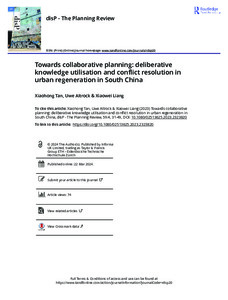| dc.date.accessioned | 2024-04-15T15:13:48Z | |
| dc.date.available | 2024-04-15T15:13:48Z | |
| dc.date.issued | 2024-03-22 | |
| dc.identifier | doi:10.17170/kobra-2024041510002 | |
| dc.identifier.uri | http://hdl.handle.net/123456789/15671 | |
| dc.description.sponsorship | Gefördert im Rahmen des Projekts DEAL | |
| dc.language.iso | eng | |
| dc.rights | Attribution-NonCommercial-NoDerivatives 4.0 International | * |
| dc.rights.uri | http://creativecommons.org/licenses/by-nc-nd/4.0/ | * |
| dc.subject.ddc | 720 | |
| dc.title | Towards collaborative planning: deliberative knowledge utilisation and conflict resolution in urban regeneration in South China | eng |
| dc.type | Aufsatz | |
| dcterms.abstract | Urban regeneration in post-reform China has become a fertile ground for the transition towards collaborative planning, which serves as a powerful tool for managing conflicts and addressing complex urban challenges. This article aims to delve into the micro-level processes that underpin the emergence of collaborative planning in practical urban regeneration projects in China. By shedding light on these micro-level processes of conflict resolution, we aim to provide a deeper understanding of how collaborative planning is implemented within the Chinese authoritarian context. Deliberative knowledge utilisation is intricately interwoven with the process of problem framing, exerting a significant influence on how conflicts are approached and ultimately resolved. We employ framing analysis as an analytical approach to demonstrate how problem framing is shaped by deliberative knowledge utilisation and is discursively constructed, drawing on empirical studies of the contentious Enning Road case in Guangzhou.
Regarding the problem framing related to the legitimacy of demolition and planning, institutional knowledge pertaining to planning leg islation and administrative procedures was intentionally wielded by the media and local residents to challenge the legitimacy of demolition. Concerning the problem framing related to the preservation of historic buildings, local knowledge was actively harnessed and deliberately employed by residents and the media to underscore the historical and cultural significance of the neighbourhood. Regarding problem framing centred on resistance to resettlement and eviction, residents intentionally incorporated institutional knowledge when composing and submitting petition letters. These three lines of problem framing, grounded in deliberative knowledge utilisation, significantly impact power dynamics and facilitate the incremental transition towards collaborative planning, which emerges as a gradual process marked by experimentation and the resolution of conflicts. | eng |
| dcterms.accessRights | open access | |
| dcterms.creator | Tan, Xiaohong | |
| dcterms.creator | Altrock, Uwe | |
| dcterms.creator | Liang, Xiaowei | |
| dc.relation.doi | doi:10.1080/02513625.2023.2323820 | |
| dc.subject.swd | China | ger |
| dc.subject.swd | Stadtplanung | ger |
| dc.subject.swd | Wissensmanagement | ger |
| dc.type.version | publishedVersion | |
| dcterms.source.identifier | eissn:2166-8604 | |
| dcterms.source.issue | Issue 4 | |
| dcterms.source.journal | disP - The Planning Review | eng |
| dcterms.source.pageinfo | 31-49 | |
| dcterms.source.volume | Volume 59 | |
| kup.iskup | false | |


